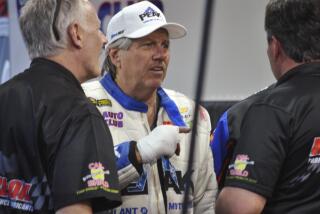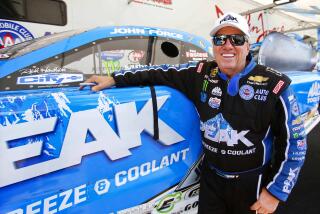Speed Demons : Father-Son Team From El Toro on Fast Track in Drag Racing
EL TORO — A teen-ager with a fast car may be like a lemming leaning over the edge, but Mike Dudleston survived those years and is moving even faster.
After spending his first few years as a licensed driver trying to squeeze more speed out of street vehicles, Dudleston, a 20-year-old from El Toro, now finds his automotive thrills on the drag strip.
In only his second season of racing in the National Hot Rod Assn., Dudleston won the Super Gas class of the NHRA Northwest Nationals in Seattle. Winning the Super Gas class in a national event is a rare occasion even for an experienced racer, but the odds might have been stratospheric for Dudleston, racing in only his fifth national.
Yet, Dudleston drove his 1977 Chevrolet Vega through seven rounds of competition against older drivers, defeating Ray Andrews of Victoria, British Columbia, in a 1927 Roadster in the finals Aug. 4. It was only the second time Dudleston had advanced as far as the third round in a national event. Once sponsors pay, the victory should be worth $10,000.
“I don’t know anybody who was as surprised as me, but still quite a few people were shocked,” Dudleston said. “It was just my day. Everything went my way.
“It was the first time that it even dawned on me that I was a contender. The main thing I had going for me was that I had such a good state of mind knowing the car was working awesome.”
For the uninitiated, the NHRA Super Gas division can be as inscrutable as calculus to a pre-schooler. “My friends that have been going with me as long as I have been racing still don’t understand it,” Dudleston said.
As in most drag racing competitions, the object is to reach the finish line first. But there’s a catch: A driver who gets there too fast is disqualified.
To reward skilled driving and limit mechanical advantages of a race car, Super Gas is set up with an index of 9.9 seconds, the lower time limit for the quarter-mile race. To win, a driver must cross the finish line first without breaking the 9.9 barrier. If both drivers finish faster than 9.9, the one closest wins.
With such a slim envelope for victory, minor details become crucial, so race teams keep track of conditions during each race.
For instance, Dudleston’s team, led by his father, Bob, maintains logs of altitude, air density and wind speed and internal conditions such as engine temperature and air pressure in the tires. The Dudlestons try to replicate previous successful races, making minor adjustments to try to get closer to the 9.9 ideal.
Computerized devices, which delay the start and disengage the throttle, aid the driver, but during the race Dudleston has nothing more than instinct telling him his actual elapsed time.
It all came together for the Dudleston team on the final day in Seattle. In his final four heats, Dudleston finished within .011 seconds of 9.9 three times. In the fourth round he finished exactly 9.9 and the final he was 9.909.
“Some people can run very consistently and make it look easy no matter what age they are,” said Scott Kendig, a fellow Super Gas competitor who said success depends 80% to 90% on the driver. “Mike can do that.”
Despite the complexities of Super Gas, it is one of the most popular NHRA divisions. A major reason is that the start-up costs are flexible.
“It doesn’t boil down to who has the most money in a car, which is nice for someone trying to break in,” said Kendig, who sold the Dudlestons their Vega for $10,000 in 1989.
Bob Dudleston was looking to buy a transmission for the family’s other dragster, a Nova, when he met Kendig at a swap meet. Although racing had become a family hobby, Bob Dudleston admitted he was a neophyte when he impulsively agreed to buy a transmission and the Vega from Kendig.
“I just felt like a complete fool,” Bob Dudleston said of the family’s early forays into serious racing. “We didn’t know anybody or anything.
“The first three months we owned the car, we were afraid to touch it.”
Through reading and advice from other racers, the Dudlestons learned enough to compete in about 12 races in their first year.
“It’s our competitors who have made us competitive,” Bob Dudleston said.
“I don’t want to say that we know everything now. We’re still rookies and novices. Mike just had a good day and the car ran perfectly.”
Bob Dudleston, who still races the Nova in some local events, said his son was a natural from the moment he sat in the car.
“I hate to admit it . . .” he said. “My son’s a better driver than I am. Much better.”
Mike Dudleston caught the speed bug soon after he turned 16. He went to work on his first car--a Volkswagen Fastback.
“It was still slow, but it had a little more pep,” he said.
Within a year, he had ditched the VW for a Chevrolet Camaro, which soon had a new engine.
“It was a race car on the street,” he said.
Apparently, a police officer thought so, too, and gave Dudleston a street-racing ticket, although the car wasn’t moving. The charges were dropped for lack of evidence, Dudleston said.
Still, for a 17-year-old El Toro High School senior with a Camaro that could travel a quarter mile in just more than 12 seconds, the temptation to race on the street was tantalizing. He admits hanging around the street race scene but says he wasn’t drawn in.
The risks and penalties--a friend was fined $1,800 after a conviction--were too high a price.
“That’s how I got into drag racing,” Dudleston said. “I’d race anyone in my Camaro if they would do it at the strip because for one thing, they weren’t going to cheat and for another, I wouldn’t have to worry about the cops.”
Such worries are only memories for Dudleston, who has sold his Camaro and works for a Garden Grove industrial safety supply company.
Bob Dudleston is president of the company, which allows the father-son pair flexible vacation time to pursue further drag racing glory. The class is so competitive that it’s rare for a driver to win more than one national Super Gas event in a year. But the Dudlestons plan to try three more times--in Topeka, Kan., in September, in Dallas and the Winston Finals in Pomona in October.
As for the future, the younger Dudleston would like to make the drag racing big leagues and drive a Nitro-burning Funny Car.
“If I could drive one by the time I’m 30, I’d be on cloud nine,” he said. “But there’s no hurry. It’s not like football where you have to retire.”
More to Read
Go beyond the scoreboard
Get the latest on L.A.'s teams in the daily Sports Report newsletter.
You may occasionally receive promotional content from the Los Angeles Times.










